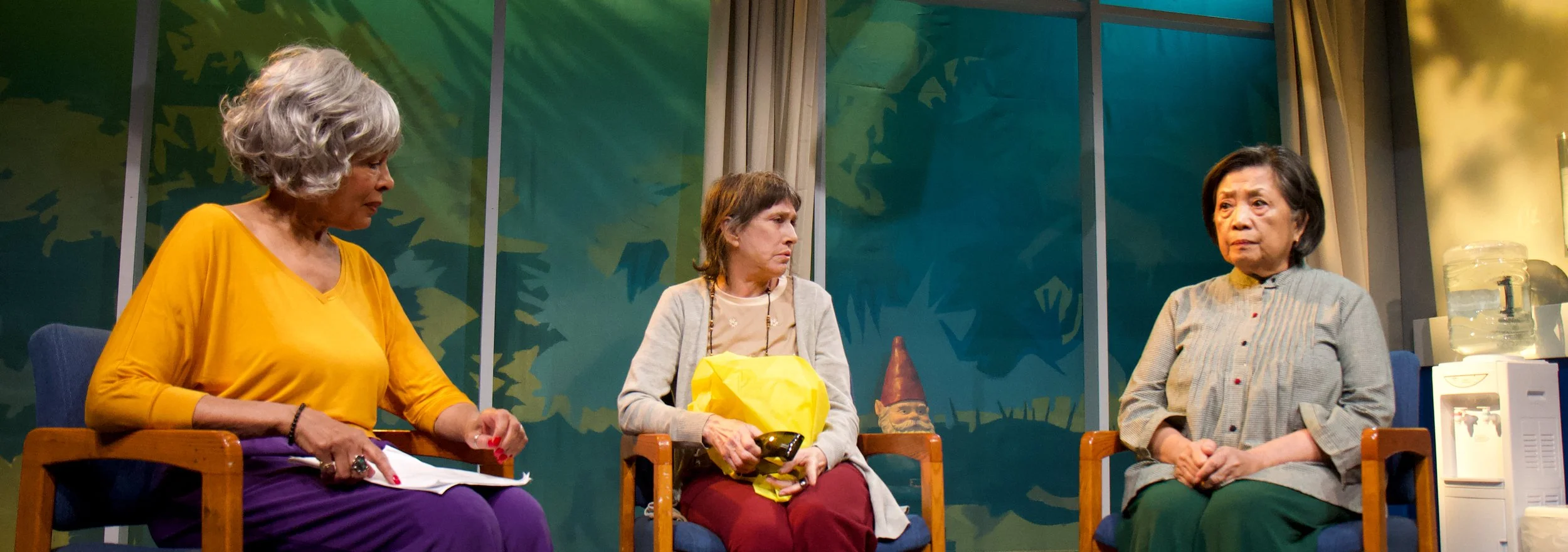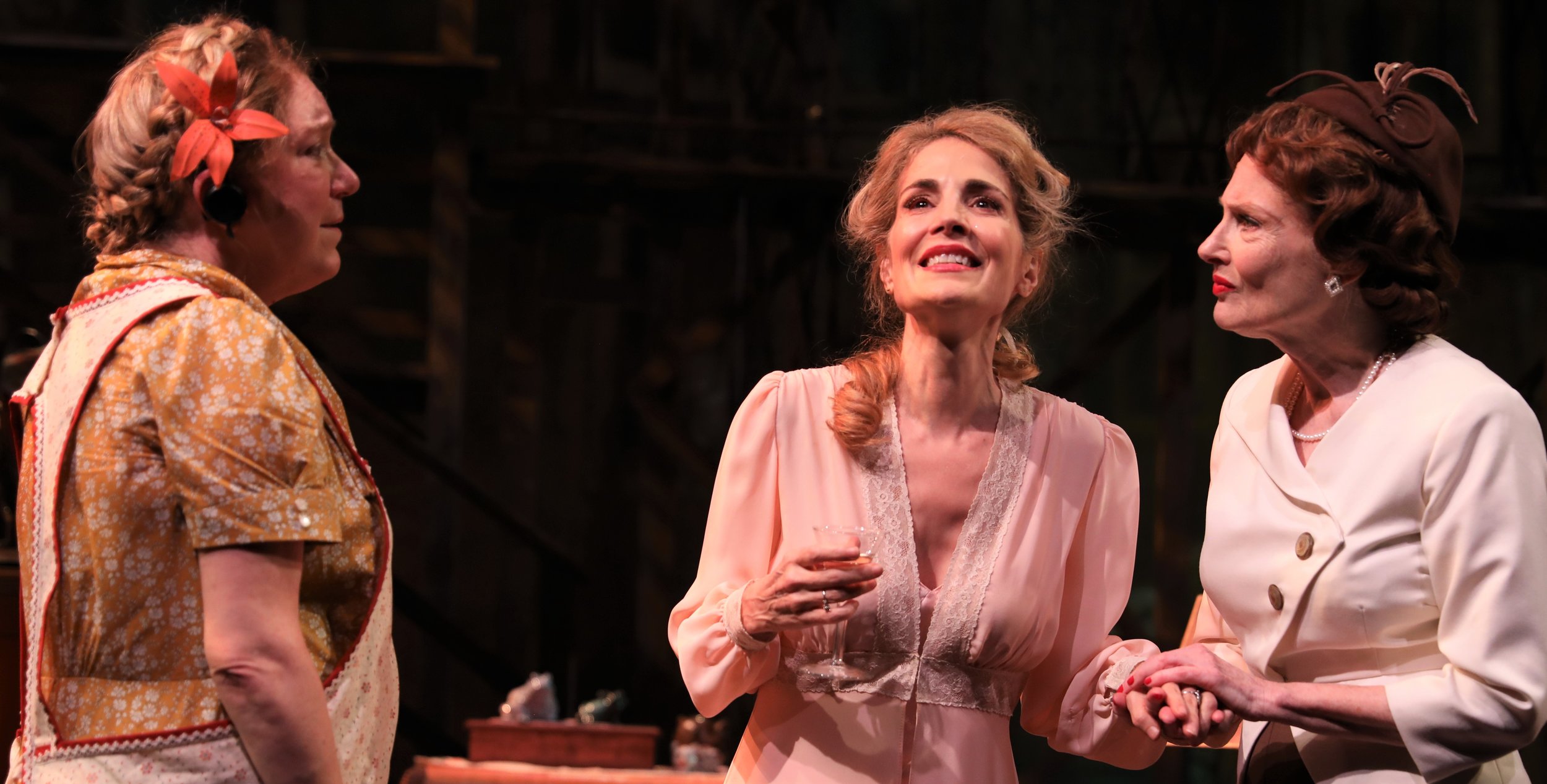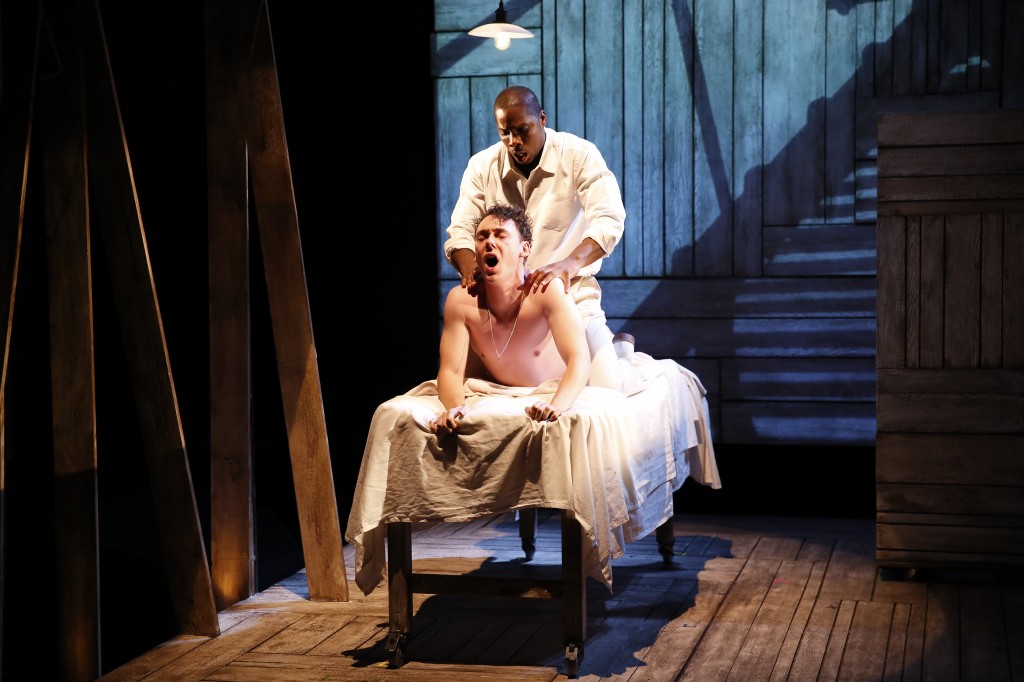In a letter to Jay Laughlin, founder of the publishing house New Directions, in late 1945, Tennessee Williams wrote about his process: “All of my good things, the few of them, have emerged through this sort of tortured going over and over—Battle [of Angels], [The Glass] Menagerie, the few good stories. ... But always when I look back on the incredible messiness of original trials I am amazed that it comes out as clean as it does.” The bill of two one-acts under the umbrella title Outraged Hearts—early versions of The Glass Menagerie and A Streetcar Named Desire, revived by the Fire Weeds theater company—confirms the messiness Williams alludes to. As ambitious as Fire Weeds’ project is, it yields little beyond the confirmation of Williams’s own words.
A Streetcar Named Desire
Tennessee Williams’s A Streetcar Named Desire has one of drama’s greatest female roles—Blanche DuBois, perhaps only rivaled by Shaw’s St. Joan and Ibsen’s Hedda Gabler. It’s a theatrical mountain that any serious actress would like to scale, and Patsy Ferran deserves credit for doing so, even if the Almeida Theatre production visiting BAM from London comes up short. Directed by Rebecca Frecknall, this Streetcar also features the better-known Paul Mescal (of Gladiator II renown) as Stanley Kowalski.
The Night of the Iguana
Tennessee Williams’s The Night of the Iguana is often considered his last great play, but the 1961 milestone was created amid stress and anguish. The role of Hannah Jelkes was written for Katharine Hepburn, but Spencer Tracy needed her care; Margaret Leighton played it and won a Tony. Bette Davis, difficult to imagine as the sensual Maxine Faulk, was at her most tyrannical during tryouts; she left the production after three months. Elia Kazan didn’t direct, though he lauded the work of Frank Corsaro, who did. In the end, however, the play survived, but La Femme Theatre Productions’ revival, the first in 28 years, demonstrates that pitfalls abound.
Orpheus Descending
Tennessee Williams’s Orpheus Descending is a play not frequently revived. Although it has many of the themes and elements of the major works, its premiere in 1957, directed by critic Harold Clurman rather than Elia Kazan, was short-lived. The production at Theatre for a New Audience throws into relief some of the problems. As interesting as the play may be for fans of Williams, one comes away with a sense of dissatisfaction. Williams described its theme as “more tolerance and respect for the wild and lyric impulses that the human heart feels and so often is forced to repress, in order to avoid social censure and worse.” Variety, however, judged it “a murky tale of inbred, hard-eyed people in a Mississippi village.”
Cat on a Hot Tin Roof
Last summer the Ruth Stage production of Tennessee Williams’s 1955 Pulitzer Prize–winning Cat on a Hot Tin Roof opened at Off-Broadway’s Theatre at St. Clement’s. The critical responses were uniformly mixed-to-negative, and OffOffOnline’s Charles Wright described it as a “lumbering version” of the play under Joe Rosario’s direction. Now in a “re-engagement,” as the publicity materials describe the current iteration, the production has been substantially recast, and there are a few directorial modifications. While this Cat 2.0 still lumbers, there is a noticeable improvement along with glimmers of fresh insight into the mendacious, caustic, and fiercely combative characters who populate Williams’s Mississippi Delta estate.
Cat on a Hot Tin Roof
Tennessee Williams’s Cat on a Hot Tin Roof features roles that are (pardon the expression) catnip to adventurous actors. This land mine of a play premiered in 1955, a year that, in retrospect, seems the apex of Williams’s success. The playwright’s career took off with The Glass Menagerie in 1945, followed by A Streetcar Named Desire in 1949, and continued for 28 years after Cat, until his death in 1983. During a long literary decline, he wrote a number of lesser, though admirable, plays, but even the best of those don’t measure up to his depiction of the Pollitts, a clan of nouveau riche Southern strivers squabbling over “twenty-eight thousand acres of the richest land this side of the valley Nile.”
The Glass Menagerie
Tennessee Williams’s 1945 breakout play, The Glass Menagerie, takes place in “memory,” as the brooding narrator/protagonist Tom announces at the start. In Austin Pendleton and Peter Bloch’s production at the Wild Project, Tom’s memories not only haunt the character but literally haunt the entire production with an array of spooky stage effects, which lay a chill on the evening that only the playwright’s poetry can defrost.
A Lovely Sunday for Creve Coeur
If you didn’t know that A Lovely Sunday for Creve Coeur was by Tennessee Williams, you might easily guess it. When the critic John Mason Brown reviewed A Streetcar Named Desire in 1947, he noted that play’s similarities to The Glass Menagerie: “Mr. Williams’ recurrent concern is with the misfits and the broken; with poor, self-deluded mortals… If they lie to others, their major lie is to themselves. In this way only can they hope to make their intolerable lives tolerable. Such beauty as they know exists in their dreams. The surroundings in which they find themselves are once again as sordid as is their own living.” Brown might have written the same words about Creve Coeur, first produced in 1979.
Its two main protagonists are Dorothea (“Dotty”), a young teacher, and an older woman, Bodey, from whom she rents a space in a cramped apartment (vividly evoked by Harry Feiner as a warren of furnishings with a smash of colors). The other two characters are Helena, a well-dressed, determined woman with a plan to upset the arrangement and Miss Gluck (Polly McKie), an emotional mess in a bathrobe. Her mother has recently died, and she thinks her upstairs apartment is haunted and keeps dropping down to see the sympathetic Bodey.
Kristine Nielsen (left) is Bodey and Jean Lichty is Dotty in Tennessee Williams’s A Lovely Sunday for Creve Coeur. Top: Nielsen and Lichty with Annette O’Toole as Helena.
Produced by La Femme Theatre Company, “dedicated to the exploration and celebration of the universal female experience,” Creve Coeur doesn’t have the more experimental elements of Williams’s late plays, nor even the framing device of A Glass Menagerie—although Creve Coeur is set in St. Louis, in the 1930s—but the delusions are present.
Dotty (Jean Lichty, founder of La Femme) is a struggling schoolteacher who rents space in a cramped apartment as she’s waiting for something better to turn up, specifically a phone call from Frank Ellis, the flashy high school principal who has taken her out.
Bodey (Kristine Nielsen), the landlady, is a dynamo who cooks, sympathizes and tries to interest Dotty in her brother, Buddy. Bodey has planned a regular Sunday outing for Creve Coeur, where there’s an amusement park, and she hopes Dotty will go. Buddy will be there.
Dotty knows that Bodey is playing matchmaker, despite Bodey’s denials, and she tries to emphasize her lack of interest in Buddy: “He simply isn’t a type that I can respond to…In a romantic fashion, honey. And to me, romance is—essential.” Fans of Williams can foretell there’s going to be heartbreak (crève-coeur is French for “heartbreak”), even if Dotty is shrewd enough to see past Bodey’s machinations, in Williams’s lyrical description of a grim future: “You’ve been deliberately plotting to marry me off to your brother so that my life would just be one long Creve Coeur picnic, interspersed with knockwurst, sauerkraut—hot potato salad dinners.”
Nielsen with Polly McKie as Miss Gluck. Photographs by Joan Marcus.
In spite of the lyricism, though, Williams’s extended back-and-forth between the two women feels laborious, and director Austin Pendleton, who does a fine job otherwise, makes a crucial mistake by having Bodey read a notice in the newspaper and throw it to the ground, unnoticed by Dotty; you can almost predict in the first moments that the paper has an engagement announcement involving Ellis. The action hangs like an albatross on the already repetitious dialogue of the first half.
Things pick up when Helena arrives. Annette O’Toole is a smartly dressed social climber who teaches at Dotty’s school; she has found an apartment but needs Dotty to share expenses. It’s the clash between Helena and Bodey that provides the interest.
From the start, the elegant, supercilious Helena is thwarted by Nielsen’s tough broad, and you can’t help but root for Bodey as she prevents the pushy intruder from walking all over her—even suggesting a possible physical opposition. Nielsen expertly navigates the kindness, toughness and self-delusion of her character while finding unexpected comic moments. O’Toole, too, though easy to dislike, makes Helena more than a mere snob; she is also a woman with dreams who is too proud to admit she needs a helping hand. Lichty charts Dotty’s slow disintegration of confidence and her growing fragility and frustration, but her Dotty never implodes, even when her hopes are dashed. McKie, in a part that requires little English but expertly accented German, excels in making the weepy Gluck memorable.
Ultimately, it’s the actors who refresh the tired themes of this late Williams drama. Williams fans who rarely have the chance to see his lesser plays in good productions will welcome this opportunity.
La Femme’s production of A Lovely Sunday for Creve Coeur plays through Oct. 21 at Theatre at St. Clement’s (423 West 46th St.). Evening performances are at 7 p.m. Wednesday and Thursday and at 8 p.m. Friday and Saturday; matinees are at 2 p.m. Saturday and 3 p.m. Sunday. Tickets are $55–$99 and may be purchased by calling (866) 811-4111 or visiting lafemmetheatreproductions.org.
Tennessee Stretching
The opportunity to see two late plays by Tennessee Williams, one a world premiere, is a tempting prospect for theater lovers. Although the general judgment prevails that The Night of the Iguana (1961) was his last great work, there have been productions of the failed plays of the later years that attempt to restore luster to them. The Two-Character Play, Kingdom of Earth, A Lovely Sunday in Crève Coeur, and In the Bar of a Tokyo Hotel have their partisans. In the same spirit, the ambitious Playhouse Creatures Theatre Company has put together a bill of A Recluse and His Guest and The Remarkable Rooming-house of Mme. Le Monde, both written in 1982, the year before Williams died. They are strange one-acts, and if they were by a lesser-known writer they might not be worth a look. However, they benefit from the inventive shoestring productions given them by director Cosmin Chivu and provide an engrossing evening.
Justin West’s set for each features junk: mounted animal heads, Cornell-like boxes and rusty radiators clutter the space; crates serve as chairs and tables. Buzzy TV monitors are used in both works, most unusually in A Recluse and His Guest, which is set in “a far northern town in a remote time.” The TV monitors are less out of place among costumer Angela Wendt’s furs, greatcoats, and leather aprons and boots, which suggest a Game of Thrones era and a fairy-tale setting that jibes with the plot of Recluse. Into the town of Staad trudges a starving, penniless woman, Nevrika (Kate Skinner), to start life anew. She has trekked through forests and fields and avoided wolves. She is scorned by townspeople, but after an encounter with a wealthy but amoral “gentleman,” Nevrika arrives at the door of a recluse, Ott (Ford Austin), and insinuates herself into his life.
Quite apart from his desire to be alone, Ott has justifiable misgivings about Nevrika. For one thing, she talks to animals, cawing occasionally and bringing home a hen that lays eggs for them. Gradually, he adjusts to her company and finds her useful as she straightens his home, rubs his back and helps him bathe. He allows her to stay even after a letter of warning arrives about her. Skinner invests Nevrika with cunning and desperation, and Austin’s Ott is both harsh and floundering in the face of her growing affection. Her grooming him for an appearance at the spring ball in Staad foreshadows a Shavian ending.
The Remarkable Rooming-house of Mme. Le Monde is a shorter and slighter piece. A starving cripple named Mint lives in the attic of a rooming-house, where he is raped by the young son of Mme. Le Monde regularly. Mint (Jade Ziane) hauls himself around his upper room on hooks that descend on ropes, but the ropes are of varying heights, and sometimes he falls to the floor. When an old school chum, Hall (Patrick Darwin Williams) arrives, things turn ugly. Mint has biscuits (i.e., cookies, since the piece is set in London) and tea for his guest, who has stopped to service Mme. Le Monde (Skinner again, in a red fright wig) on his way upstairs. But the nattily dressed Hall, who is a confidence man, helps himself to tea and biscuits relentlessly, keeping the hapless Mint away from nourishment.
Willliams’s dialogue in the piece can seem like a high-school version of Joe Orton: Hall and Mint were educated together at the sniggeringly named Scrotum-on-Swansea. “At Scrotum-on-Swansea you were a notorious fag and bed-wetter, but reasonably mobile,” Hall recalls with a posh accent. “Now you get about only by swinging from hook to hook, like that historical ape-man swinging from branch to branch in the jungle.” The sexual frankness, arch dialogue and nudity are part of Orton’s repertoire, and, as John Lahr points out in Tennessee Williams: Mad Pilgrimage of the Flesh, in 1982 Williams was working on another play, A House Not Meant to Stand, which “broadcast the influence of British playwright Joe Orton.” Clearly Mme. Le Monde, from the same year, also reflects Orton, but it lacks the comic snap of the younger man’s work.
Mme. Le Monde ends grimly but satisfyingly. Chivu has used the TV monitors skillfully to replace a collapsible staircase called for by the script. These short plays aren't earth-shattering discoveries, but they have many small pleasures, not least for fans of Williams’s work. Playhouse Creatures deserves credit for spotting those rewards.
Two one-act plays, A Recluse and His Guest and The Remarkable Rooming-house of Mme. Le Monde, comprise Tennessee Williams 1982, presented by Playhouse Creatures Theatre Company through March 6 at Walkerspace (46 Walker St. between Broadway and Church Street) in Tribeca. Evening performances are at 7:30 p.m. on Feb. 24–28, March 2–6, and March 9–13, with a matinee on March 5 at 3 p.m. Tickets are $40 and may be purchased by calling 800-838-3006 or visiting PlayhouseCreatures.org.
An Evening Called Desire
The wonderful (and often weird) works of Tennessee Williams have graced the stages of New York City in a kaleidoscope of iterations. From The Glass Menagerie and A Streetcar Named Desire on Broadway, to his later, queerer works in off-off-Broadway houses, there has hardly been a lack of opportunities to see this beloved American playwright’s work come to life in our city. An interesting new addition to the menagerie of Williams' productions is The Acting Company’s Desire: An Evening of Plays Based on Six Stories by Tennessee Williams at 59E59 Theaters. Authored by six different playwrights, the short plays in Desire take a variety of approaches to their adaptations of Williams’ short stories, which he wrote throughout his career. The quality and composition of each vignette is as varied as the dramaturgical approaches, but overall, Desire amounts to an enjoyably mottled evening of play, all in the spirit of Tennessee.
Most impressively, Desire boasts a knockout cast. Every performer is solidly dedicated to their character and action, but Liv Rooth and Megan Bartle stand out in particular. Rooth commands the room as Clara in Tent Worms and proceeds to dazzle with Anna’s frenetic energy in Oriflamme. Bartle demonstrates an impressive range as a weepy fiancée, Betty, in You Lied to Me About Centralia and then as a curious sorority girl, Layley, in The Field of Blue Children. As Layley, Bartle delivers a sexually triumphant and revelatory monologue, which practically brought the house down. Indeed, Williams’ spirit is perhaps best communicated through the talents of this versatile cast.
Each short play varies greatly in style, structure and language. Beth Henley’s The Resemblance Between a Violin Case and a Coffin and Rebecca Gilman’s The Field of Blue Children are both plot-driven, heavy on events and action, and aim to tell a complete story. Despite their structuring, these plays’ best moments occur when they swerve away from their plots to divulge into character development. On the other hand, Marcus Gardley’s Desire Quenched by Touch, Elizabeth Egloff’s Tent Worms, and David Grimm’s Oriflamme situate seemingly everyday characters within apparently normal narratives, but in true Williams' style, each story gradually distorts itself into a strange and otherworldly version of reality. Finally, John Guare’s You Lied to Me About Centralia is an adaptation of “Portrait of a Girl in Glass,” which is the short story that inspired The Glass Menagerie. This short play rewards the audience with winks at the Wingfield characters and their eccentric dinner.
Director Michael Wilson situates each play in its own discrete style—in honoring the diversity of the playwrights—but blends their worlds together via beautifully choreographed scene transitions. Wilson also highlights Williams’ affinity for objects, which are so often laden with rich and symbolic meaning. His staging illuminates important objects such as Anna’s swishy red evening gown (Oriflamme), Richard Miles’ coffin-like violin case (The Resemblance Between a Violin Case and a Coffin), Jim’s glass figurine (You Lied to Me About Centralia), and Grand’s paper bag lunch (Desire Quenched By Touch). One thing the overall production lacked was a Williams-esque rawness: its staging and design were quite safe, lacking some of the grit and strangeness that often pervades Williams' writing, but is often ignored and polished over.
Undeniably, the cast and production is well-rehearsed and everything runs smoothly and professionally; but perhaps a little more impromptu wildness and odd eccentricities would have raised the stakes on its effect. In any case, Desire is a most welcome addition to the Tennessee Williams performance repertoire, and these short plays add flourish to the posthumous portrait of this strange and beloved author.
Desire: An Evening of Plays Based on Six Stories by Tennessee Williams plays through through Oct. 10 as part of the 5A Season at 59E59 Theaters (59 E. 59th St. between Park and Madison Aves.) in Manhattan. Evening performances are on Thursday at 7 p.m. and on Friday and Saturday at 8 p.m. Matinees are at 2 p.m. on Saturday and 3 p.m. on Sunday. Single tickets are $70 ($49 for 59E59 members). To purchase tickets, call Ticket Central at 212-279-4200 or visit www.59e59.org.




















